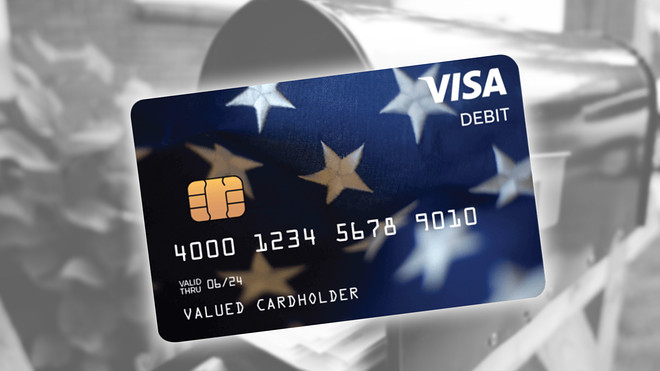9:45 am
They might look like a scam, but the white envelopes from an Omaha-based entity called “Money Network Cardholder Services” that many Americans received this week are surprisingly legit. Inside those envelopes, which are finally being delivered to millions of Americans, are Visa-branded debit cards loaded up with coronavirus stimulus payments from the federal government.
“It’s honestly due to sheer luck that I decided to open them, because inside one was a notice that my federal stimulus money was being disbursed to me on an enclosed prepaid debit card,” Alanna Okun, a deputy editor at Vox’s The Goods, told Recode in a message.
While she eventually activated the card and used it to purchase groceries, she said: “I am still nettled because nobody told me this was going to happen, and it just as easily could have ended up in the garbage.”
Some people aren’t so lucky. An untold number of Americans, believing the envelopes are junk mail or the debit cards are a scam, are ignoring them or throwing them out. And it’s understandable why they would be cautious: Credit-card-related schemes have been on the rise since the pandemic began, according to the Wall Street Journal, and the Federal Trade Commission (FTC) has been busy warning people about stimulus payment-related scams.
One person reported the official government debit cards to the Better Business Bureau’s Scam Tracker. “The letter states this is our Economic Impact Payment card and has a Department of the Treasury seal on the letter,” reads the complaint. “This has to be a scam!”
People have been calling their local officials, asking about whether the letter is a rip-off. Others have reached out to their local television stations. The North Carolina attorney general’s office told Recode it had received several calls from concerned constituents, including one from someone who had already thrown out their payment card.
Some people have even reported the stimulus debit cards to the Federal Bureau of Investigation (FBI), though when asked about the issue, the agency said it would not provide additional information.
Officials are now scrambling to spread the word to Americans that the debit cards are not, in fact, part of a scam. Hopefully, most of the millions of people meant to receive these cards get the message, but it seems likely that countless Americans will overlook or throw out those scammy-looking envelopes purporting to be from the federal government. They could also lose the coronavirus stimulus payments to which they are entitled.
It’s not clear why these problematic debit cards were needed
The Internal Revenue Service (IRS) announced the first round of Economic Impact Payments being deposited in people’s bank accounts on April 11, leading to a storm of confusion over whether people should expect a direct deposit or wait for a paper check. Some six weeks after those first payments were disbursed, Treasury Secretary Steve Mnuchin announced that close to 4 million Americans would not receive either direct deposit or a check. Instead, they would get their economic impact payments through prepaid Visa debit cards.
While 4 million sounds like a lot, those Americans receiving debit cards in the mail represent a small sliver of the total population receiving payments. The Treasury Department says it has already sent more than 140 million payments. The department also explained in a press release that people receiving prepaid debit cards would be those “without bank information on file with the IRS, and whose tax return was processed by either the Andover or Austin IRS Service Center.” It’s unclear what makes these centers exceptional, but if you’re from Massachusetts or Texas, pay extra-close attention to your mail.
At a press conference, Mnuchin said that the debit cards were an effort to “expedite money to people even quicker in a very safe way.” He also hinted that debit cards could be used in the future, saying, “Going forward, we think debit cards are a safe and secure way of delivering refunds.”
To debut the new cards, the government built a website — EIPcard.com — that says the debit card will arrive in a plain envelope from “Money Network Cardholder Services,” and would include “Visa” on the front and the name of the issuing bank, “MetaBank,” on the back. (MetaBank is a bank that the Treasury Department has used since 2016 to send people payments from federal agencies.) The site explains that to activate the card, recipients need to call an 800 number and confirm their identity with their address, name, and the last six digits of their Social Security number. There are also links to the cardholder agreement and a fee schedule.
The Economic Impact Payment (EIP) card itself features a generic-looking image of blue fabric with white stars, like an American flag. As with pretty much any debit card, there are some fees associated with using the EIP card. The first out-of-network ATM withdrawal, for instance, is free, but each subsequent withdrawal comes with a $2 fee. If you do a balance inquiry at an ATM, that carries an additional 25 cent fee, either in or out of network. A replacement card if it’s lost or stolen costs $7.50. Priority shipping for the replacement card costs an additional $17.
Still, there’s something suspicious-seeming about all of this. The website is branded as a “Money Network” site, and it’s only further down the page that it says, “The EIP Card is sponsored by the Treasury Department’s Bureau of the Fiscal Service as part of the US Debit Card Program.” It doesn’t seem like this has been enough to clear up the confusion. On Wednesday, the IRS released a statement emphasizing that the agency “reminds” people about how the prepaid debit cards would arrive, while still warning people to be wary of scams.
Source: {Matzav.com}
